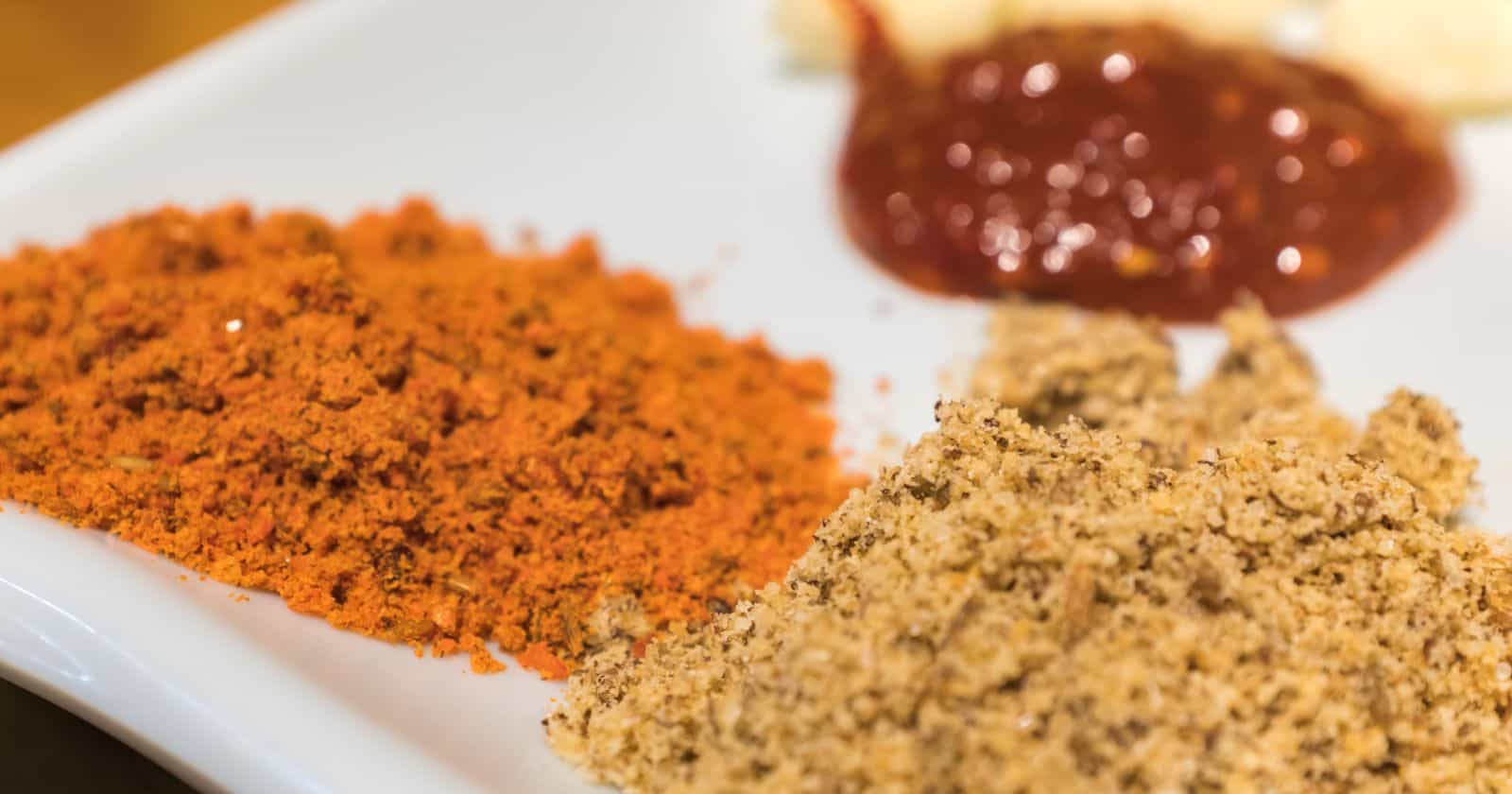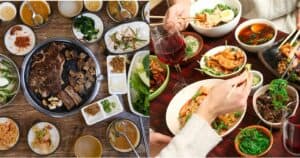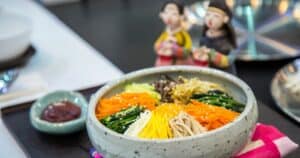Are you ready to embark on a flavor-filled journey to the land of Korean BBQ? Imagine succulent meats and perfectly seasoned vegetables tantalizing your taste buds with every bite. But what exactly is in Korean BBQ seasoning? Join us as we uncover the secrets behind this popular blend and learn how you can recreate the magic in your own kitchen.
Korean BBQ seasoning typically includes a combination of chile flakes, salt, ground rice hulls, white and black sesame seeds, tamari soy sauce powder, black peppercorns, mustard seeds, light brown sugar, and a touch of cayenne pepper. Additional ingredients, such as garlic, ginger, and other spices, may also be included depending on the recipe or brand.
The Essential Ingredients of Korean BBQ Seasoning
Korean BBQ seasoning is a delicious blend of flavors that can enhance the taste of various dishes. It typically consists of a combination of different ingredients. Here are some commonly used ones:
Chile flakes: These bring a spicy kick to the seasoning and add a depth of flavor.
Salt: A staple ingredient in any seasoning, salt helps to bring out the natural flavors of the other ingredients.
Ground rice hulls: This unique ingredient adds a nutty flavor and a pleasant texture to the seasoning.
White sesame seeds: These seeds are commonly used in Korean cuisine and impart a subtly nutty taste.
Black sesame seeds: Similar to white sesame seeds, black sesame seeds provide a slightly more intense flavor.
Tamari soy sauce powder: This powdered form of soy sauce adds a savory umami taste to the seasoning.
Black peppercorns: These add a hint of spiciness and a peppery aroma to the seasoning.
Yellow mustard seeds: Mustard seeds bring a mild tanginess to the mix, balancing out the flavors.
Brown sugar: A touch of sweetness from brown sugar helps to balance the spiciness and adds depth to the seasoning.
Cayenne pepper: For those who like a little extra heat, cayenne pepper can be added to amp up the spiciness.
Ground cumin: Cumin adds a warm and earthy flavor to the seasoning.
Granulated garlic: Garlic enhances the overall flavor profile of the seasoning and adds a hint of pungency.
Mustard powder: Similar to mustard seeds, mustard powder contributes a tangy taste.
Smoked paprika: This ingredient adds a smoky and slightly sweet flavor to the seasoning.
Sea salt (finely ground): The finely ground sea salt disperses evenly and enhances the overall taste of the seasoning.
Korean BBQ seasoning can be found pre-made, or you can create your own blend using these ingredients. It’s important to note that while Korean BBQ seasoning can add flavor to dishes, it’s essential to be mindful of portion sizes and added calories from other ingredients. Korean cuisine is known for its focus on healthy cooking techniques and using less oil, making it a delicious and nutritious choice.
Exploring the Significance of Chile Flakes in Korean BBQ Seasoning
Chile flakes play a significant role in Korean BBQ seasoning, bringing both heat and flavor to this popular dish. Made from dried and crushed chili peppers, chile flakes are a common ingredient in many cuisines, including Korean.
In Korean BBQ seasoning, chile flakes are often combined with other spices and seasonings like salt, sesame seeds, and soy sauce powder. This combination enhances the overall taste profile of the dish, creating a balance between spiciness and savory flavors.
The heat level of chile flakes can vary depending on the type of chili pepper used and the amount added to the seasoning. One popular type of Korean chile flake is gochugaru, commonly used in Korean cuisine and specifically in Korean BBQ seasoning. Gochugaru has a unique fruity, smoky, and sweet aroma, making it different from other types of chile flakes like crushed red pepper flakes. It offers a moderate level of spiciness, adding just enough heat to the seasoning without overpowering the other flavors.
Unlocking the Secrets of Sesame Seeds in Korean BBQ Seasoning
Sesame seeds play a vital role in Korean BBQ seasoning, adding a delightful nutty flavor and a satisfying crunchy texture to the dish. These tiny seeds are commonly used as a garnish in Korean cuisine, particularly in vegetable side dishes (namul) and dipping sauces. Roasted sesame seeds, whether they are white or black, are sprinkled on top of these dishes, enhancing both their appearance and taste.
In addition to the seeds, sesame oil is another key ingredient in Korean cuisine, including Korean BBQ seasoning. This fragrant oil is widely used in various dishes, such as side dishes, rice dishes, and dipping sauces. Its nutty aroma and savory flavor bring a unique taste to the food. When combined with sesame seeds, the oil enhances the overall flavor profile and adds an enticing texture to the Korean BBQ seasoning.
The combination of sesame seeds and sesame oil in Korean BBQ seasoning showcases the harmony between crunchiness and richness. The seeds provide a delightful crunch, while the oil contributes a luscious texture and depth of flavor. Together, they transform ordinary Korean BBQ dishes into extraordinary culinary experiences.
Understanding the Role of Tamari Soy Sauce Powder in Korean BBQ Seasoning
Tamari soy sauce powder plays a crucial role in adding a savory and umami flavor to Korean BBQ seasoning. Made from dried tamari sauce, which is a Japanese version of soy sauce, it is thicker, heartier, and has a richer soy flavor compared to Chinese soy sauce.
One of the key features of tamari sauce is its complex and umami profile, which adds depth and intensity to Korean BBQ seasoning. This unique flavor is a result of tamari sauce being a byproduct of miso fermentation. When this sauce is dried and turned into powder form, it becomes even more concentrated, making it perfect for seasoning blends.
In Korean BBQ seasoning, tamari soy sauce powder is often combined with other spices and seasonings, such as chile flakes, salt, sesame seeds, and garlic. This combination creates a well-balanced and flavorful seasoning that enhances the taste of grilled meats and vegetables. Whether used as a dry rub or mixed with water to create a dipping sauce or marinade, tamari soy sauce powder adds an authentic and delicious element to Korean BBQ dishes.
Furthermore, tamari soy sauce powder is a gluten-free ingredient, making it suitable for those with dietary restrictions. It can be used as a pantry staple, offering a convenient and versatile way to enhance the taste of various dishes, not just Korean BBQ. With its rich flavor and easy-to-use powdered form, tamari soy sauce powder is a beloved ingredient in Korean cuisine that elevates the overall flavor profile of BBQ dishes.
Highlighting the Flavors of Mustard Seeds and Black Peppercorns in Korean BBQ Seasoning
Mustard seeds and black peppercorns are essential components of Korean BBQ seasoning, providing a spicy and pungent flavor to the dish. These ingredients are typically toasted and ground together with other spices like cumin, coriander, and fennel seeds to create a rich and complex seasoning.
Mustard seeds contribute a distinct pungency and spiciness to the Korean BBQ seasoning, adding depth and intensity to the flavor profile. Meanwhile, black peppercorns bring both
When combined with other seasonings such as chile flakes, salt, and sesame seeds, mustard seeds and black peppercorns help create a well-balanced and flavorful Korean BBQ seasoning. These ingredients work together to produce a complex
It is important to use mustard seeds and black peppercorns in moderation to avoid overpowering the other flavors in the dish. By using them sparingly, you can add a spicy kick to your Korean BBQ without overshadowing the other ingredients. Finding the right balance between these powerful spices is key to achieving a harmonious and enjoyable flavor experience.
The Perfect Balance: Light Brown Sugar in Korean BBQ Seasoning
Light brown sugar is a common ingredient in Korean BBQ seasoning, adding sweetness and balancing out the flavors. It complements other seasonings like chile flakes, salt, sesame seeds, and garlic, creating a well-rounded taste without overpowering it.
Light brown sugar, commonly used as a replacement for dark brown sugar, plays a crucial role in Korean BBQ seasoning. When combined with other seasonings, such as chile flakes, salt, sesame seeds, and garlic, it creates a complex and flavorful blend. By adding a touch of sweetness, light brown sugar helps balance out the
What makes light brown sugar ideal for Korean BBQ seasoning is its ability to enhance the overall taste without overwhelming the other flavors. It should be used in moderation to prevent overpowering the dish. This perfect balance ensures that the sweetness of the sugar complements and accentuates the spicy and savory components, creating a well-rounded taste experience.
Adding a Touch of Heat: Cayenne Pepper in Korean BBQ Seasoning
Cayenne pepper is a popular ingredient in Korean BBQ seasoning, known for adding a kick of heat and spiciness to the dish. This type of chili pepper is often used in moderation to enhance the flavor profile without overpowering other tastes. It is commonly combined with other seasonings like chile flakes, salt, sesame seeds, and garlic to create a complex and flavorful Korean BBQ seasoning.
When using cayenne pepper, it’s important to note that the level of heat can vary depending on the quantity used and the specific brand or type of pepper. Generally, cayenne pepper has a Scoville heat rating of around 30,000 to 50,000, making it less spicy compared to some other chili peppers. This range ensures that the heat is present but isn’t overwhelming, allowing the other flavors to shine through.
In Korean BBQ seasoning, cayenne pepper is often added alongside other seasonings to achieve a balanced and harmonious blend of flavors. Its heat is carefully measured to provide a touch of spiciness that complements the savory and umami notes without overpowering them. The combination of cayenne pepper with chile flakes, salt, sesame seeds, and garlic creates a robust and tantalizing seasoning that elevates the taste of Korean BBQ dishes.
Enhancing the Flavor with Garlic and Ginger in Korean BBQ Seasoning
Garlic and ginger are two common ingredients in Korean BBQ seasoning that add a savory and aromatic flavor to the dish. Roasted garlic is often used to add a sweet and savory flavor, while fresh ginger is used to add a spicy and aromatic flavor. They are frequently combined with other seasonings like chile flakes, salt, sesame seeds, and soy sauce powder to create a complex and flavorful seasoning.
One of the key ways to enhance the flavor of Korean BBQ seasoning is by using roasted garlic. Roasting garlic brings out its natural sweetness and mellows its pungency, resulting in a deliciously rich flavor. The roasted garlic can be used in moderation to add a subtle yet distinct taste to the dish without overpowering the other flavors.
Fresh ginger is another essential ingredient in Korean BBQ seasoning that elevates the taste profile. Known for its spicy and aromatic properties, ginger adds a zing to the seasoning mix. It complements the other flavors and helps create a well-balanced and flavorful dish.
When using garlic and ginger in Korean BBQ seasoning, it is important to finely grate or mince them to ensure they are evenly distributed throughout the mix. This helps to maximize their flavors and allows them to blend harmoniously with the other seasonings. Additionally, using them in moderation ensures that their flavors do not dominate the dish but rather enhance the overall taste.





